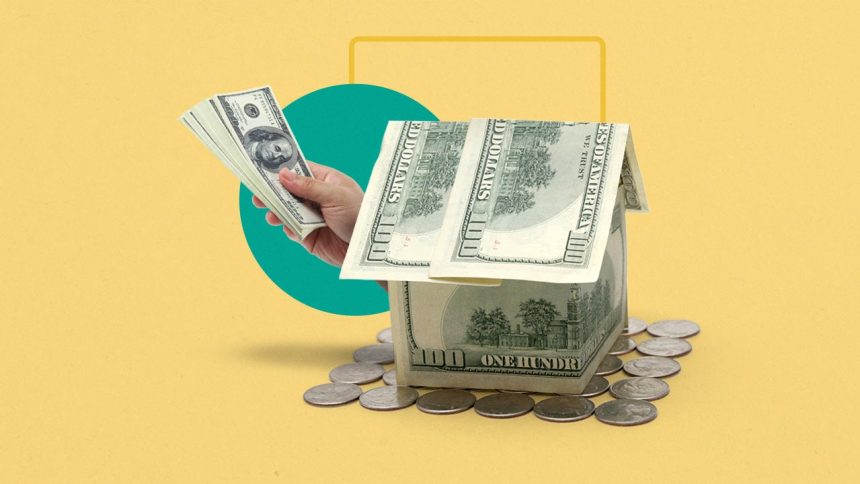Images by Getty Images; Illustration by Issiah Davis/Bankrate
Key takeaways
- Refinancing your mortgage costs anywhere between 2 to 5 percent of the amount of the new loan. These closing costs might include an application, origination and home appraisal fees.
- To determine whether it’s worth paying to refinance, figure out when you’ll break even — the point at which the savings on your new mortgage surpasses the upfront cost.
- You can save on the cost of refinancing by boosting your credit score, comparing mortgage terms and rates and negotiating closing costs.
Refinancing your mortgage can help you get a lower monthly payment, turn equity into cash or change up your loan type and term. The process isn’t free, however — there are upfront expenses similar to when you first got the mortgage. When considering refinancing, it’s important to see if these numbers make sense for your savings goals.
How much does it cost to refinance?
The average mortgage refinance runs $2,375 in closing costs, excluding any taxes, according to ClosingCorp. These costs vary primarily according to the size of your loan and where you live. Generally, you can expect to pay between 2 percent and 5 percent of the new loan balance in closing costs. If you’re refinancing a $200,000 mortgage, say, you might be looking at anywhere between $4,000 and $10,000 in closing costs. Here’s a breakdown of common closing costs:
| Closing costs | Fee |
|---|---|
| Application fee | $75 – $300 |
| Origination and/or underwriting fee | 1% – 1.5% of loan principal |
| Recording fee | $25 – $250 depending on location |
| Appraisal fee | $500 – $1,000 |
| Credit check fee | $25 |
| Title services | $300 – $2,000 |
| Survey fee | $140 – $400 |
| Attorney/settlement fee | $500 – $1,000 |
Along with closing costs, you’ll pay interest at a new rate. This rate depends on many variables, including:
- Your credit score
- Lender
- Type of refinance
- Loan size and term
- Property type
How to lower the cost to refinance
The less you pay to refinance, the more money you stand to save on interest and the quicker you’ll realize those savings. Here are some tips to lower the cost of the new loan:
1. Boost your credit score
Just as you aimed for a certain credit score when you applied for your first mortgage, you’ll need to meet credit score minimums to refinance, too. The better your credit, the lower your refinance rate. Among several strategies, you can boost your credit by paying down or paying off debt.
2. Compare mortgage offers and rates
To help you score the best possible rate, shop around and compare options from several mortgage refinance lenders. Look at the annual percentage rate (APR) — which measures the cost of interest and fees — to get a fuller sense of the loan’s cost. Consider working with a mortgage broker to get a range of offers. Always be sure to get a quote from your existing lender, too, in case it offers a lower-cost refi or other repeat customer benefits.
3. Negotiate closing costs
As with your first mortgage, look closely at the loan estimate from your lender to understand the exact cost to refinance. You might save yourself some money by negotiating closing costs, especially if you’ve shopped around and have more than one refinance offer in hand. You can use other quotes to check for unusually high fees, as well.
4. Ask for fee waivers
In the same vein, ask your bank or lender if it will waive or lower the application fee or credit check fee. You can also see if you can forgo a new home appraisal or property survey if you’ve recently had one done. Your lender might be willing to work with you, particularly if you’re an existing customer.
5. Assess whether to buy mortgage points
If you want to lower your mortgage refinance closing costs, consider whether buying mortgage or discount points is worth it. While buying points lowers your interest rate, it’s usually best only when you expect to own the home for a long time and don’t plan to refinance again — even to pay for a major renovation later on.

Bankrate’s mortgage refinance calculator
Use our free mortgage refinance calculator to estimate your monthly mortgage payments.
Use the calculator
6. Go with your original title insurer
In many states, title rates are regulated, but you can try to cut down your title services costs by asking your current title insurance company how much it would charge to reissue the policy for your refinanced loan. Doing this might cost less than starting over with a new company or policy.
7. Consider a no-closing cost refinance
If you’re low on cash, consider a no-closing cost refinance. The name is a bit deceiving, as this refinance isn’t free of closing costs; you simply won’t have to pay the fees at closing. Instead, the lender will either raise your interest rate or fold the closing costs into the new loan.
FAQ on refinancing your mortgage
Read the full article here













